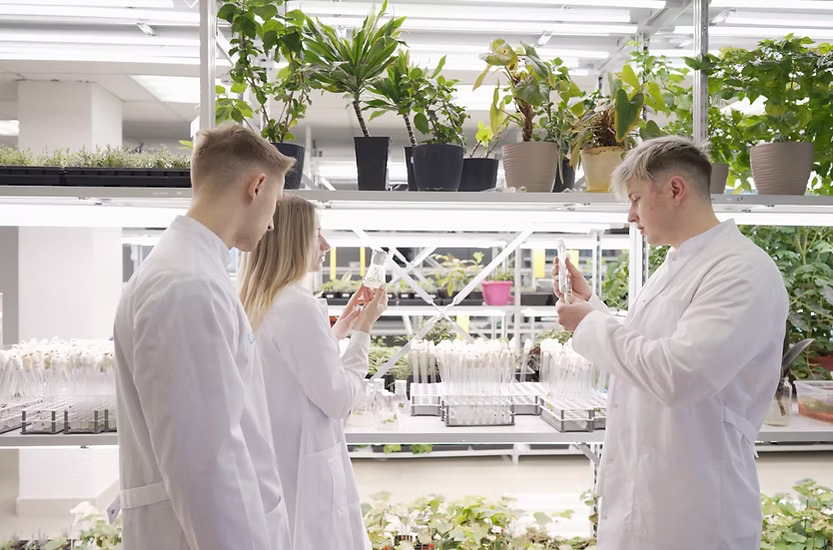Food security has become one of the most pressing global challenges of the 21st century. With a growing population, climate change, and environmental degradation threatening agricultural productivity, sustainable solutions are urgently needed. Among these solutions, biofertilizer suppliers play a critical role in ensuring the availability of safe, nutritious, and sufficient food for future generations. By providing eco-friendly, nutrient-rich alternatives to chemical fertilizers, these suppliers are not only supporting crop yield but also promoting environmental sustainability.
The Growing Challenge of Food Security
Global food demand is projected to increase significantly in the coming decades, driven by population growth, urbanization, and changing dietary patterns. Traditional agricultural practices, reliant on synthetic fertilizers and pesticides, have boosted productivity but often at the expense of soil health, water quality, and biodiversity. Depleted soil and reduced fertility threaten long-term agricultural sustainability, raising concerns about food availability and security.
In this context, biofertilizers offer an innovative approach to maintain soil fertility, enhance crop yields, and reduce dependency on harmful chemicals. By harnessing beneficial microorganisms, biofertilizers improve nutrient availability and stimulate plant growth naturally.
Understanding Biofertilizers and Their Role
Biofertilizers are living organisms that enrich the soil with essential nutrients. Unlike conventional fertilizers that supply nutrients in chemical form, biofertilizers improve nutrient absorption and stimulate soil microbial activity. These natural products support nitrogen fixation, phosphorus solubilization, and decomposition of organic matter, creating a healthy and balanced soil ecosystem.
Biofertilizer suppliers ensure that these products reach farmers in optimal conditions, providing guidance on proper application and storage. By bridging the gap between research and practical agriculture, suppliers help farmers adopt sustainable practices that contribute to food security.
Benefits of Biofertilizers for Agriculture
The advantages of biofertilizers extend beyond immediate crop yield improvements. Some key benefits include:
1. Enhancing Soil Health
Biofertilizers improve soil structure and increase microbial diversity. Healthy soil retains water better, reduces erosion, and promotes long-term fertility. By fostering natural nutrient cycles, biofertilizers reduce the need for synthetic inputs and support sustainable farming.
2. Reducing Environmental Impact
Chemical fertilizers can lead to nutrient runoff, water pollution, and greenhouse gas emissions. Biofertilizers, being eco-friendly, minimize these negative effects and contribute to cleaner ecosystems. Sustainable agriculture practices, supported by biofertilizers, align with global environmental goals.
3. Boosting Crop Productivity
By enhancing nutrient availability and plant growth, biofertilizers can increase crop yield and quality. Crops grown with biofertilizers are often more resilient to diseases, pests, and environmental stressors, helping farmers secure their produce and income.
4. Supporting Cost-Effective Farming
Biofertilizers are often less expensive than chemical fertilizers in the long term. By improving soil fertility naturally, they reduce the dependency on costly synthetic inputs, making farming more economically sustainable.
Integrating Organic Inputs in Modern Agriculture
The use of organic fertilizer for agriculture is increasingly recognized as a key component of sustainable farming. Organic fertilizers complement biofertilizers by providing essential nutrients in a natural form, enhancing soil fertility and microbial activity. The combined use of biofertilizers and organic fertilizers reduces reliance on chemical products while promoting healthy crop growth.
Farmers who integrate these natural inputs often observe improved soil texture, enhanced nutrient cycling, and higher quality produce. Furthermore, organic fertilizers help retain soil moisture and contribute to long-term soil carbon sequestration, an important factor in climate mitigation.
The Supply Chain and Role of Biofertilizer Suppliers
Biofertilizer suppliers are not just product distributors—they are knowledge providers and facilitators of sustainable agriculture. Their responsibilities include:
- Ensuring high-quality and viable microbial formulations
- Educating farmers on application methods and dosage
- Conducting field demonstrations and training programs
- Monitoring soil health and crop response
By performing these roles, suppliers ensure that the benefits of biofertilizers are fully realized. They act as a crucial link between agricultural research institutions, product manufacturers, and farming communities, enabling widespread adoption of sustainable practices.
Challenges Facing Biofertilizer Adoption
Despite their benefits, the adoption of biofertilizers faces certain challenges:
- Awareness Gap: Many farmers remain unfamiliar with biofertilizer products and their advantages.
- Storage and Handling: Biofertilizers contain living organisms that require proper storage and handling.
- Consistency in Quality: Variations in microbial content and product formulation can affect performance.
- Integration with Existing Practices: Transitioning from conventional to bio-based fertilizers requires careful planning and support.
Addressing these challenges requires strong partnerships among suppliers, policymakers, agricultural experts, and farmers. Awareness campaigns, training programs, and quality control measures are essential for scaling biofertilizer use.
Global Perspective and Local Implications
Globally, countries are increasingly recognizing the importance of biofertilizers in achieving food security. Policies encouraging sustainable agriculture, organic farming, and environmental protection create a favorable landscape for biofertilizer adoption.
In regions like the Middle East, where arid conditions and soil challenges limit conventional farming, biofertilizers offer a viable solution. They improve nutrient uptake in nutrient-poor soils and enhance plant resilience to environmental stress, making them vital for regional food security initiatives.
Future Outlook
The future of agriculture depends on the adoption of sustainable practices that ensure long-term soil fertility and crop productivity. Biofertilizer suppliers will continue to play a central role in this transformation by providing farmers with innovative products and knowledge support.
As global demand for safe, organic, and sustainable produce grows, the integration of biofertilizers with organic fertilizer for agriculture practices will become increasingly important. This holistic approach ensures that farming systems remain productive, environmentally responsible, and capable of meeting the nutritional needs of the population.
Final Thought: Building a Sustainable Food Future
Agro products companies, such as uTerra Middle East Agro Industries, exemplify the potential of combining innovation with sustainability. By supplying high-quality biofertilizers and supporting farmers with expertise, these companies contribute to a resilient agricultural ecosystem.
The future of food security relies not only on increased production but also on sustainable methods that protect soil health, water resources, and biodiversity. By fostering collaboration between biofertilizer suppliers, farmers, and agro products companies, it is possible to achieve a balance between productivity and environmental responsibility. Investing in biofertilizer solutions today lays the foundation for a secure, sustainable, and prosperous agricultural future.

